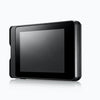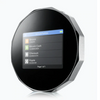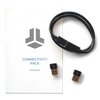Cryptocurrencies have been getting heaps of attention during the past several years. More and more people are learning about cryptocurrency and it’s benefits and are entering the market each day.
Such popularity - combined with the promise of very high financial gain - also attracts its fair share of bad actors. There were dozens of cases of large crypto theft throughout 2021 and a few already in 2022.
Due to the liabilities of having your account hacked, it's crucial to keep your crypto safe and know the potential risks of keeping it in the exchange or online in general.
Today, we'll look at how crypto is stolen and what you can do to prevent cryptocurrency theft.
Recent Cases Of Crypto Theft
The issue with a lot of data or safety exploits is that it's rarely obvious while something is happening. Users or customers only notice strange account activity once it's too late. And by then, exchanges or platforms have already allowed malicious crypto transactions to occur and the assets are gone for good.
To begin painting a picture of how severe of a problem cryptocurrency theft is, let's just look at the last month of 2021. December of 2021 saw four critical security breaches.
BadgerDAO is the first of these cases. It started with several reports of certain "unauthorized withdrawals of funds" from the users. How much are we talking about here? Well, around 2100 Bitcoins (which are valued at $19 million), and approximately 150 Ethereum, which comes in at about $680K. The attack in question was a front-end attack aimed at BadgerDAO's delivery network. After a malicious script was injected, users began noticing their funds missing.
Around December 6th, BitMart also had its network hacked. Hackers weren't playing with this platform, either, with a reported estimate of $150-200 million worth of stolen funds. Most of the victims of these hackers' attacks are just regular people who tried to invest and save up for the future. These crypto owners were left with practically nothing. And yes, we're talking about BitMart - the very platform that prides itself on being highly trusted and secure.
Not even a week later, on December 12th, a group of hackers stole over $135 million in Ethereum from VulcanForged, a blockchain gaming company. A total of 96 users were compromised, to be more precise. Hackers got a hold of the private keys of almost a hundred users and took complete advantage of it.
And lastly, AscendEX saw an attack on the same day as VulkanForge. While the estimated losses are not as big as the ones mentioned so far, it's still a $77 million loss.
That's four cases in less than two weeks.
Stolen crypto doesn't simply disappear, though, at least not permanently. Once the account has been hacked, its resources (coins and tokens) quickly get diverted to different accounts and it becomes nearly impossible to recover.
Using Crypto Wallets
Storing crypto in a crypto wallet is similar to storing cash inside your regular, physical wallet. Your cryptocurrency is kept in a safe space where no one but you has access to your account information or money. However, crypto wallets can get hacked, especially “hot wallets” (more on that later).
Crypto wallets come in two primary types. These are online (hot) wallets and hardware (cold) wallets.
There are various safety measures (e.g., 2FA) that restrict access to your resources to anyone without approved access. Most commonly, however, these security measures come in the form of secure private keys.
What Type of Crypto Wallet Is the Most Secure?
The easiest method of holding your cryptocurrency is on the exchange you bought them on, of course. That's the quickest and easiest solution because you don’t have to transfer your assets anywhere and it works for a lot of people.
However, an exchange essentially holds your cryptocurrency on an “IOU” basis. And your assets are entirely in their hands, to protect or to lose.
Whether you own only a few hundred dollars worth of crypto or several thousands, losing any of it will hurt. And that brings us to discussing the different types of wallets you can store your crypto in.
Hot Wallets
An online wallet - also called a "hot wallet" - is a form of digital storage and one of the alternatives to keeping your assets off the exchange. You can access these wallets through any device, be it a phone or a computer.
Lots of services will offer a hot wallet for free. Though often connected with an exchange, they're still a better option than keeping assets directly on the platform you bought them on. Still, they are not the best solution out there.
Seeing as they are always connected to the Internet, that makes them susceptible to potential security breaches and theft .
Custodial And Non-Custodial Wallets
The terms "custodial" and "non-custodial wallets" essentially refer to the party responsible for the wallet's security and the digital currency on it.
Custodial wallets presume the presence of a third party - in this case, an exchange. An exchange owns the private keys to the wallet and gives you a confirmation of your digital tokens in an "IOU" fashion. So essentially, the exchange holds all of your digital assets until you decide to withdraw them.
Not worrying about a password or a private key getting lost is a big advantage that a custodial wallet offers.
Digital currency exchanges regularly work to upgrade and maintain their users' safety. Whether it's confirmation via phone number (which nobody recommends) or 2FA (two-factor authentication), there are free and simple solutions for safety management.
Yet, a good number of investors will tell you that you're not safe unless you hold all authentication. As the saying goes, “not your keys, not your coins”.
Online wallets can also be non-custodial. If someone goes for this option, they are fully responsible for the security measures. The wallet's owner is the only one at fault for any lost keys or passwords.
Hardware Wallets
A hardware wallet, otherwise known as a "cold wallet", is a physical device that enables you to store and protect your tokens or coins.
Keeping Bitcoin, Ethereum, and other cryptocurrencies stored on a small hard drive that only you can unlock is reassuring, and certainly far more reassuring than trusting someone else to keep everything protected from hackers.
Benefits Of A Hardware Wallet
If you're still on the fence about spending money on a cold wallet for your coins, here are several advantages to consider.
First, with a hardware wallet, you're not prone to any software attacks or fraud. Tens of thousands of accounts could be compromised during one hacker attack, but since cold wallets are separate from these connections, they're not prone to these types of security breaches.
Next, you generate an encrypted pin or seed phrase that's tied to your wallet address. This form of protection is good for mitigating brute force attacks on your account. Only you know the pin, and only you can use it.
You can only enter said encrypted pins through the device itself. In other words, there's no coming into contact with computers that could potentially cause a security breach.
Only you get access to the private key of your wallet and only you verify all purchases through it, as well. So, as long as you just keep your information safe, nobody can perform any transactions without your approval.
How To Protect Your Crypto From Being Stolen
Keep your private keys safe!
Your private keys have to be kept in a safe place at all times. Neglecting this simple truth can cost you thousands very quickly.
Many exchanges won't do anything if your currency gets stolen because, more often than not, it's due to the user's inability to keep their private data secure and protect it. And yes, many victims of rigged transactions haven't been compensated - nor will they be.
So, keep your private keys locked up somewhere safe but know how to recover them should something happen.
Hardware wallets are a far safer alternative to keeping your cryptocurrency on the exchange. Users can transfer their digital assets from an exchange and store the coins in a safe place, guarded by encrypted private keys and multiple levels of security software.
If you see value and potential in this market and are considering diving into it, take every step you can to keep yourself protected and store your assets safely.






















































